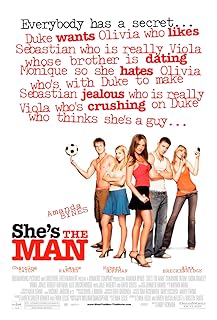
2015-02-14 05:42:57
The Switch on 「Sex」 and Gender
************這篇影評可能有雷************
She is the Man is a teen flick that based on Shakespeare's Twelfth Night, which is about a girl who pretends to be her twin brother in order to play her favorite sport soccer. Many stereotypes of gender roles about males』 masculinity and females』 femininity have been shown in She, and many of these stereotypes have been parodied to critique gender inequality.
Although She is the Man tells a story about girl sport (soccer), discourse of gender roles is the theme because of the important employment of a 「reversed sex」 in the film. First, the catalyst of the story is the protagonist Viola’s high school cuts the girls』 soccer team, and the coach refuses to let her try out for the boys team—「Everybody knows girls aren』t as fast or strong or athletic as boys」. This is the most obvious example of gender stereotype and sexism; it becomes the motif of Viola’s impersonation of her brother Sebastian to try out for a rival school’s boys』 team and prove herself. Another example can be seen in Viola’s girly mother’s parenting on girlhood—all she wishes for her daughter is to dress nice, be ladylike and have a cute boyfriend. Viola’s attempt to break gender stereotype from school and parent is feminist. However, the plot itself of Viola has to "become a man" in order to earn respect as well as the opportunity to play soccer is an implication of gender inequality.
Yet, the film has employed many unexpected events to mock or satirize gender roles. On the one side, it suggests a girl can play both male and female roles if she wants, Viola’s masquerading as a boy is the best case. In addition, the film also implies 「inside every girl, there is a boy」 from Viola’s male friend Paul’s mouth. For example, during the mother-daughter dinner, Olivia, the gender-normative 「lady」, fights with Sebastian’s 「ex」-girlfriend. The fight scene is very manlike and aggressive, which might be exaggerated for comedy effect, but still, it does make the audiences wonder if the previous ladylike was just a fake; it also becomes an interesting echo to Paul’s words.
On the other side, the film also constantly makes a dig at male’s feminine part. One example is Duke, the typical jock who is supposed to be masculine, is actually very shy and becomes tongue-tied when he is with girls. And he is sacred of bugs just like Viola,; there is this scene he and 「Sebastian」 (Viola) scream and jump onto the same bed just to dodge a spider. Another classic example is when 「Sebastian」 (Viola) first moves into dorm, she accidentally drops her female product, which is seen by Duke. He asks why she has tampons in her boot, she says she gets bad nose bleeds implying she stick them up the nose. When Duke and his male friends get surprising face, she even says Beckham does it all the time. What is funny is, later in the film, Duke really uses tampon to suck nose bleeding after a fight. This not only surprises Viola, who does not think a guy would actually use tampons (even though she is the one makes it up), but also becomes an irony to his early response to this story. Although the film does not explicitly say, it is clearly enduring the idea that female can be manlike and masculine (playing soccer, flight, etc.), and male can be ladylike and feminine (use woman product, fear of bugs, etc.)
Reading this teen comedy as a whole—it is amusing to see the switch of masculinity in female and femininity in male, and more interestingly, this is approached through a real 「sex switch」, a girl in boy’s disguise—Shakespeare might laugh as well.
© Lydia L
3/16/2011
未經許可
請勿轉載

